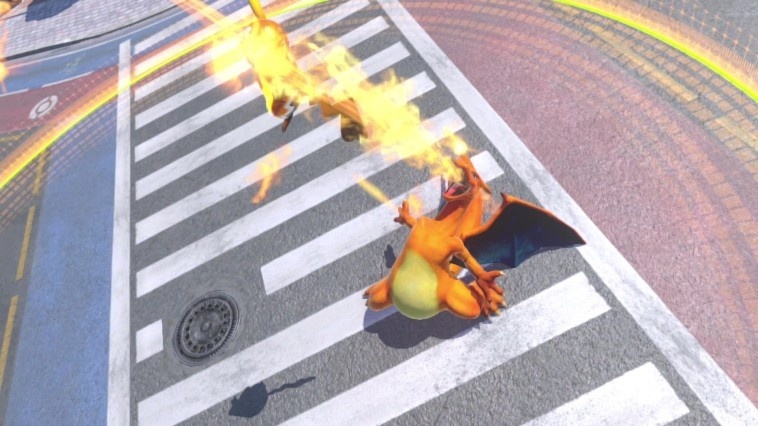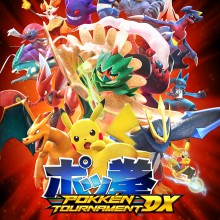Pokkén Tournament DX (Nintendo Switch) Review
By Renan Fontes  25.09.2017
25.09.2017

From the arcade, to the Wii U, and now the Switch, iPokkén Tournament has been around the block during its short lifetime. While the fighter did reasonably well on the Wii U, it didn't amass the playerbase it could have on another console. Along with releasing at the tail end of the Wii U's life cycle, there was little hope for the poor beast. Like Mario Kart 8 before it, however, the death of the Wii U did not mean Pokkén had to die. With a projected larger install base, a year one release, and all the DLC from the original, the Switch may just be the best home Pokkén Tournament DX could hope for.
Phase shifting is Pokkén's way of differentiating itself from a vast sea of more prolific fighters. Battles take place on a dynamic stage where the gameplay can shift between an arena style presentation called "Field Phase," and a more traditional 2D plane called "Duel Phase."
Phases are effortlessly switched between during the course of battle. Certain attacks can transition a Field Phase into a Duel Phase, and vice versa. Phase shifting becomes less of a gimmick and more of a tactical consideration once play styles are taken into account. Some Pokémon will naturally be more suited for a 3D arena, so keeping the stage in a Field Phase is just as important as fighting the opponent. Mindlessly mashing buttons can lead to a situation where the phase shift falls in favour of the other Pokémon.
This variety in stage design plays off nicely in regards to the roster. While the character selection is a bit on the smaller side for a series with 802 characters to choose from, the present Pokémon are well picked and reflect as much of the franchise's history as possible. This is as much an entry in the Pokémon franchise as it is a fighting game.

Pokémon gain experience after battles and can level up. Unlike the main series, however, stats must be levelled manually. Each level offers a point and each point can go into attack, defence, synergy, and strategy. This change in how levelling up works allows for a deeper sense of intimacy with the roster. It's satisfying to pick a Pokémon and gradually build them into a powerhouse. That said, levelling up too much can easily trivialize the story mode. The Ferrum League isn't particularly difficult to begin with, so it may be worth putting off attributing points once the challenge starts to dip.
Although the RPG elements may be appealing to fans of the series, they can be a bit alienating to fans of the genre more inclined towards a skill-based fighter. Thankfully, stats and levels are optional for most modes, meaning that there is a way to play without artificial enhancements for each Pokémon.
Because no Pokémon is complete without a trainer, an avatar can be customized and acts as the one giving orders during the battle. As simple as an avatar is, this is a nice feature since it keeps up the illusion of playing as the trainer, and not the Pokémon, to an extent. It's just one of the many additions Pokkén Tournament utilizes to feel like a proper Pokémon fighter instead of just a fighting game that happens to feature Pokémon.

Mechanically speaking, the gameplay isn't particularly complex. Combos can be strung together with considerable ease and most attacks don't demand much in the way of pulling off button combinations. All this means, however, is that Pokkén Tournament ends up being a more accessible title for a wider audience. Its aesthetic calls out to fans of the series, its simplicity welcomes fighting newcomers, and its field shifting offers something unique for genre veterans.
Synergy bursts act as Pokkén's answer to super moves. Bursts can be triggered as soon as the special meter has been filled. Once activated, the affected Pokémon's moveset slightly changes and their stats increase by either Mega Evolving or undergoing an equivalent transformation. By activating the burst again, Pokémon can also unleash an ultra move.
Along with choosing a fighter, support Pokémon can be selected for battle. Supports always work in pairs, so selecting a character feels more like choosing three. Which support is active is decided at the beginning of each round and, once their meter has been filled up, they can be activated to either attack the opponent and offer some sort of buff or debuff. Supports are a great way of adding an element of surprise and added complexity to battle while keeping the overall experience user friendly.

While there isn't too much to do once the Ferrum League is completed, the multiplayer and Daily Challenges do extend the lifespan considerably. Online can be played either ranked or friendly, as is to be expected from a modern fighter, and the Daily Challenges act as a test of the mechanics along with control over an associated Pokémon. The challenges never take too long to get through, but they do serve as a good way of levelling up the roster.
Exclusive to DX are 3-on-3 Team Battles. Unfortunately, and quite bizarrely, Team Battles are excluded from online play. There's really no reason why it shouldn't be available, and its absence will surely be felt by fans coming over from the Wii U version, since this is the only notable addition to the Switch port besides the DLC.
Regardless of how similar everything feels to the initial release, Pokken Tournament DX is absolutely worth owning. It was never going to attract the crowd it needed on the Wii U, but its port to the Switch will surely give it a second wind. If nothing else, it's still a fun single-player experience, if a bit short.

Cubed3 Rating
Great - Silver Award

Even though Pokkén Tournament DX might not offer much in the way of new content, the added longevity it'll gain by simply being on the Switch more than justifies the port. Dynamic stages that switch between a 3D arena and a 2D plane through combos keep the action exciting, and the Ferrum League, while not especially lengthy, does serve as a more than acceptable single-player campaign. With a well-designed roster that strays away from safe choices and a great support system, the action is just as good now as it was back in 2016. The lack of Team Battle as an online option is certainly disconcerting, but light RPG elements and tonal consistency with the franchise ensures that Pokkén Tournament remains one of the best Pokémon spin-offs available - and a pretty great fighting game to boot.
Comments
Comments are currently disabled

 Sign In
Sign In Game Details
Game Details
 Out now
Out now  Out now
Out now  Out now
Out now  Out now
Out now  Subscribe to this topic
Subscribe to this topic Features
Features






 Top
Top

